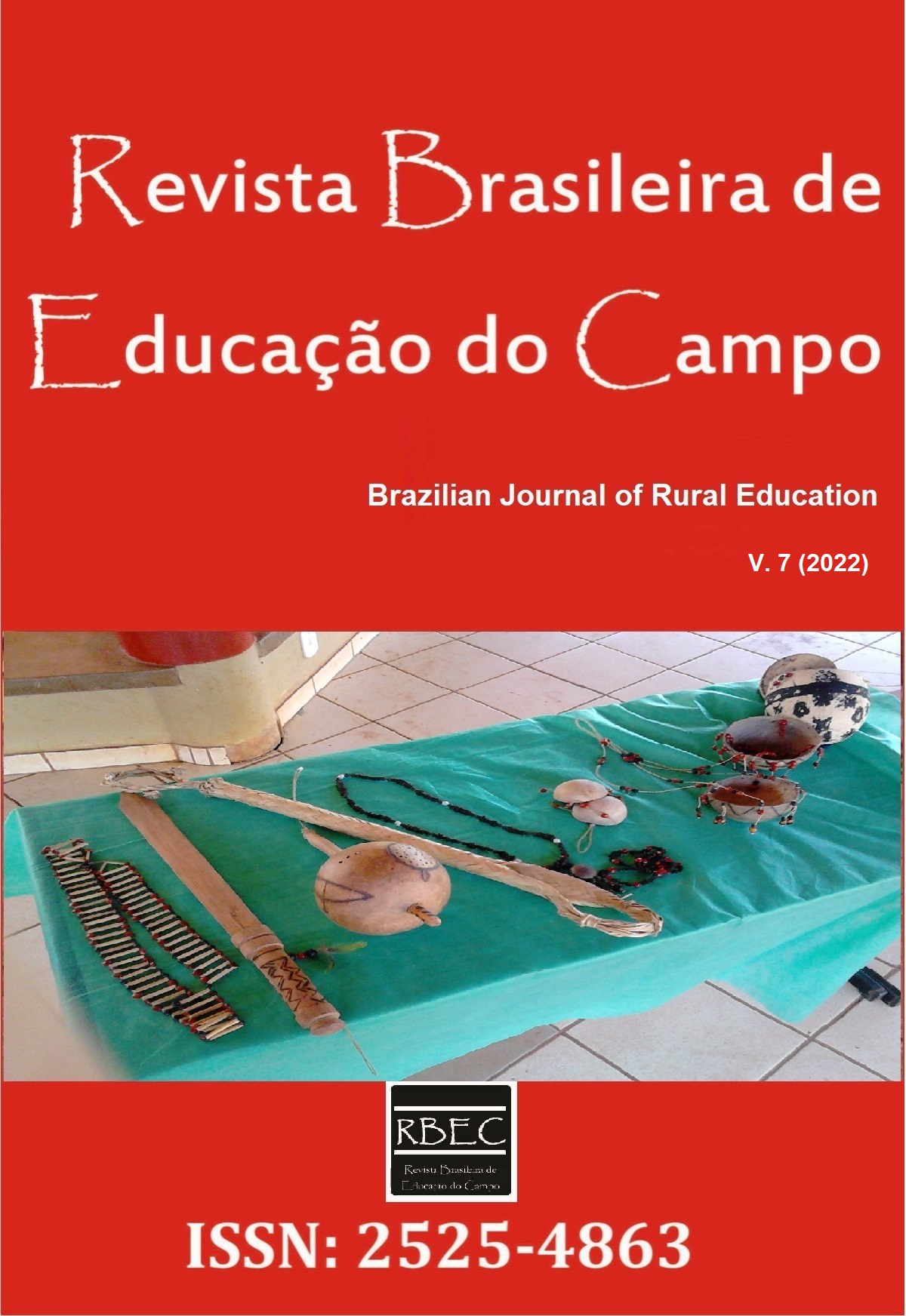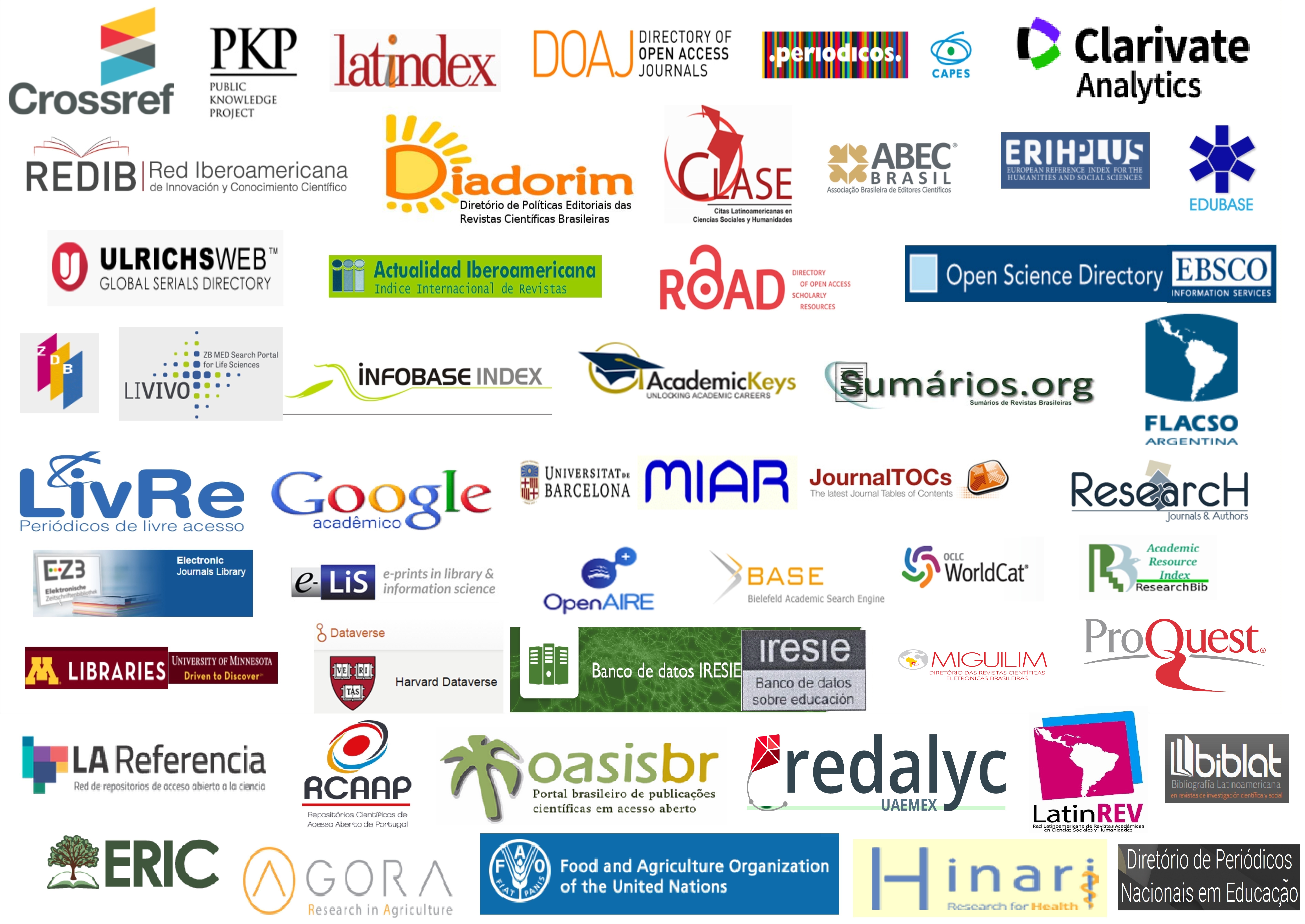Educação do campo no Ceará: uma análise do Projeto Político Pedagógico da Escola do Campo Filha da Luta Patativa do Assaré em Canindé
DOI:
https://doi.org/10.20873/uft.rbec.e12824Palavras-chave:
rural education, political pedagogical project, country school, Ceará.Resumo
Este artigo tem por objetivo geral compreender, por meio da análise do Projeto Político Pedagógico (PPP) da Escola do Campo Filha da Luta Patativa do Assaré, os pressupostos teórico-metodológicos e as categorias basilares norteadoras da Educação do Campo no Ceará: trabalho como princípio educativo, educação politécnica e educação omnilateral. Compreende-se que a Educação do Campo se constitui como uma categoria que se opõe ao tipo de educação escolar que reproduz as relações sociais contraditórias do modo de produção capitalista. Diante disso, a escola do campo, para se contrapor às relações sociais alienadas, poderá estar alicerçada num PPP que se propõe a contribuir para a formação integral dos indivíduos que compõem o espaço do campo brasileiro. Para a realização desse trabalho, recorreu-se às contribuições de autores que são referências na Educação do Campo, entre os quais podemos citar: Frigotto (2012), Caldart (2012) e Ribeiro (2012). Diante da análise do PPP, concluímos que os pressupostos presentes no documento analisado se objetivam em uma educação que busca a emancipação dos sujeitos do campo, a partir da valorização dos movimentos sociais, das lutas sociais, dos conhecimentos historicamente produzidos e de uma formação que abarque uma concepção ampla e crítica da realidade vivida.
Palavras chaves: educação do campo, projeto político pedagógico, escola do campo, Ceará.
Rural Education in Ceará: an analysis of the Political Pedagogical Project of the Field School Daughter of the Fight Patativa do Assaré in Canindé
ABSTRACT. This article aims to understand, through the analysis of the Political Pedagogical Project (PPP) of the Field School Daughter of Luta Patativa do Assaré, the theoretical-methodological assumptions and the basic guiding categories of Rural Education in Ceará: work as a principle education, polytechnic education and omnilateral education. It is understood that Rural Education is constituted as a category that opposes the type of school education that reproduces the contradictory social relations of the capitalist mode of production. In view of this, the rural school, in order to oppose alienated social relations, may be based on a PPP that proposes to contribute to the integral formation of the individuals that make up the space of the Brazilian countryside. To carry out this work, we resorted to the contributions of authors who are references in Rural Education, including: Frigotto (2012), Caldart (2012) and Ribeiro (2012). In view of the analysis of the PPP, we conclude that the presuppositions present in the analyzed document are aimed at an education that seeks the emancipation of rural subjects, based on an appreciation of social movements, social struggles, historically produced knowledge and a training that encompasses a broad and critical conception of lived reality.
Keywords: rural education, political pedagogical project, country school, Ceará.
Educación Rural en Ceará: un análisis del Proyecto Político Pedagógico de la Escuela de Campo Hija de la Lucha Patativa de el Assaré en Canindé
RESUMEN. Este artículo tiene como objetivo comprender, a través del análisis del Proyecto Político Pedagógico (PPP) de la Escuela de Campo Hija de la Lucha Patativa de el Assaré, los supuestos teórico-metodológicos y las categorías rectoras básicas de la Educación Rural en Ceará: el trabajo como principio educativo, educación politécnica y educación omnilateral. Se entiende que la Educación Rural se constituye como una categoría que se opone al tipo de educación escolar que reproduce las relaciones sociales contradictorias del modo de producción capitalista. Ante esto, la escuela rural, para oponerse a las relaciones sociales alienadas, puede basarse en un PPP que se proponga contribuir a la formación integral de los individuos que componen el espacio del campo brasileño. Para llevar a cabo este trabajo, recurrimos a las aportaciones de autores que son referentes en Educación Rural, entre ellos: Frigotto (2012), Caldart (2012) y Ribeiro (2012). A la vista del análisis del PPP, se concluye que los presupuestos presentes en el documento analizado están orientados a una educación que busque la emancipación de los sujetos rurales, a partir de una apreciación de los movimientos sociales, las luchas sociales, los saberes históricamente producidos y una formación que engloba una concepción amplia y crítica de la realidad vivida.
Palabras clave: educación rural, proyecto político pedagógico, escuela de campo, Ceará.
Downloads
Referências
Bardin, L. (2011). Análise de conteúdo. São Paulo, SP: Edições 70.
Caldart, R. S. (2004). Elementos Para Construção Do Projeto Político E Pedagógico Da Educação Do Campo. In Molina, M. C., & De Jesus, S. M. S. A. (Orgs.). Contribuições para um projeto de Educação do Campo (pp. 10-31). Brasília, DF: Articulação Nacional Por Uma Educação do Campo.
Caldart, S. R (Org.). (2012). Dicionário da Educação do Campo. Rio de Janeiro, RJ/São Paulo, SP: Escola Politécnica de Saúde Joaquim Venâncio/Expressão popular.
Número de agrotóxicos registrados em 2020 é o mais alto da série histórica; maioria é genérico, diz governo: foram liberados 493 pesticidas no ano, 4% mais do que o de 2019. (2021, 14 de janeiro). Portal G1 de notícias, p. 1-26. Recuperado de: https://g1.globo.com/economia/agronegocios/noticia/2021/01/14/numero-de-agrotoxicos-registrados-em-2020-e-o-mais-alto-da-serie-historica-maioria-e-produto-generico.ghtml.
Gramsci, A. (1978). Concepção dialética da história. Rio de Janeiro, RJ: Civilização Brasileira.
Gil, A. C. (2002). Como elaborar projetos de pesquisa. São Paulo, SP: Atlas.
Instituto Brasileiro de Geografia e Estatística (2020, 1 de julho). Cidades e Estados: Canindé. Recuperado de: https://www.ibge.gov.br/cidades-e-estados/ce/caninde.html.
Frigotto, G. (2012). Educação politécnica. In Caldart, R. S. et al. (Orgs.). Dicionário da Educação do Campo (pp. 274-280). Rio de Janeiro, RJ/São Paulo, SP: Escola Politécnica de Saúde Joaquim Venâncio/Expressão popular.
Frigotto, G. (2012a). Educação omnilateral. In Caldart, R. S. et al. (Orgs.). Dicionário da Educação do Campo (pp. 267-274). Rio de Janeiro, RJ/São Paulo, SP: Escola Politécnica de Saúde Joaquim Venâncio/Expressão popular.
Lakatos, E. M., & Marconi, M. A. (2003). Fundamentos de metodologia científica. 5. ed. São Paulo: Atlas.
Manacorda, M. A. (2010). Marx e a Pedagogia Moderna. 2. ed. Rev. Campinas: Alínea.
Marx, K. (2011). O capital: crítica da economia política. [S. L.]: Editora Boitempo.
Nascimento, M. N., Matias, M. R. S, & Teixeira, O. B. (2020). PPP's das Escolas do Campo: um olhar sobre seus fundamentos e percursos metodológicos. In Costa, F. J. F., Pereira, K. R. C., & De Paula, A. S. N. (Orgs.). Escolas de ensino médio do campo no Ceará (pp. 45-60). Curitiba, PR: Editora CRV.
Oliveira, T. M. L., & Campos M. (2012). Educação Básica do Campo. In Caldart, R. S. (Org.). Dicionário da Educação do Campo (pp. 239-246). Rio de Janeiro, RJ/São Paulo, SP: Escola Politécnica de Saúde Joaquim Venâncio/Expressão popular.
Projeto Político Pedagógico da Escola do Campo Filha Da Luta Patativa do Assaré - PPP. (2017). Canindé, CE.
Pistrak, M. M. (2000). Fundamentos da Escola do Trabalho. São Paulo, SP: Expressão Popular.
Prado, A. A. (1995). Ruralismo Pedagógico no Brasil do Estado Novo. Estudo Sociedade e Agricultura, 1(4), 5- 27.
Resolução n. 2. (2008, 28 de abril). Estabelece diretrizes complementares, normas e princípios para o desenvolvimento de políticas públicas de atendimento da Educação Básica do Campo. Brasília, DF: Ministério da Educação.
Ribeiro, M. (2012). Educação Rural. In Caldart, R. S. et al (Orgs.). Dicionário da Educação do Campo (pp. 293-298). Rio de Janeiro, RJ/São Paulo, SP: Escola Politécnica de Saúde Joaquim Venâncio/Expressão popular.
Triviños, A. N. S. (1987). Introdução à pesquisa em ciências sociais: a pesquisa qualitativa em educação. São Paulo, SP: Atlas.
Victor, G. C., Lopes, M. M. C., & Lima, M. A. (2020) Dados da Educação do Campo no Ceará. In Costa, F. J. F., Pereira, K. R. C., & De Paula, A. S. N. (Orgs.). Escolas de ensino médio do campo no Ceará (pp. 37-44). Curitiba, PR: Editora CRV.
Publicado
Como Citar
Edição
Seção
Licença
Proposta de Aviso de Direito Autoral Creative Commons
1. Proposta de Política para Periódicos de Acesso Livre
Autores que publicam nesta revista concordam com os seguintes termos:
a. Autores mantém os direitos autorais e concedem à revista o direito de primeira publicação, com o trabalho simultaneamente licenciado sob a Licença Creative Commons Attribution que permite o compartilhamento do trabalho com reconhecimento da autoria e publicação inicial nesta revista.
b. Autores têm autorização para assumir contratos adicionais separadamente, para distribuição não-exclusiva da versão do trabalho publicada nesta revista (ex.: publicar em repositório institucional ou como capítulo de livro), com reconhecimento de autoria e publicação inicial nesta revista.
c. Autores têm permissão e são estimulados a publicar e distribuir seu trabalho online (ex.: em repositórios institucionais ou na sua página pessoal) a qualquer ponto antes ou durante o processo editorial, já que isso pode gerar alterações produtivas, bem como aumentar o impacto e a citação do trabalho publicado (Veja O Efeito do Acesso Livre).
Proposal for Copyright Notice Creative Commons
1. Policy Proposal to Open Access Journals
Authors who publish with this journal agree to the following terms:
A. Authors retain copyright and grant the journal right of first publication with the work simultaneously licensed under the Creative Commons Attribution License that allows sharing the work with recognition of its initial publication in this journal.
B. Authors are able to take on additional contracts separately, non-exclusive distribution of the version of the paper published in this journal (ex .: publish in institutional repository or as a book), with an acknowledgment of its initial publication in this journal.
C. Authors are permitted and encouraged to post their work online (eg .: in institutional repositories or on their website) at any point before or during the editorial process, as it can lead to productive exchanges, as well as increase the impact and the citation of published work (See the Effect of Open Access).














